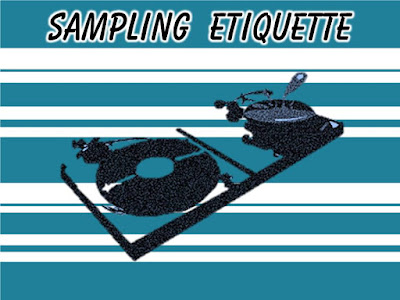Sampling Etiquette
Is there an unwritten code of what to sample and what not to
sample? Do producers and songwriters have any scruples when it comes to
sampling certain pieces of music?
I ask these questions because I recently heard a sample from
the Lomax recording collection of a group of African-American chain gang
workers in the 1940s singing a song called “Rosie.” It caught my ear because I
have been using it in my jazz history class for over a decade now to show work
songs and how the call and response aspect in them exists across all African
American music genres.
The sample was used in the new song by David Guetta
featuring Nicki Minaj called “Hey Mama.”
I do not consider myself a purist or music snob by any means and to be
honest I am conflicted about the use of sample.
I grew up in the early days of hip hop and loved the creativity in
sampling by producers and DJs like Hank Shocklee and Grandmaster Flash. Many of these producers and DJs from this era
knew where the samples came from and had a working knowledge of the original
track, because they read the liner notes (those words that used to exist on an the
back of an album that described what you were listening to).
Being the music business teacher that I am, my first
question when I heard this sample was, “are these vocalists or their families
getting any royalties from this?”
That led me to look up the details on the Lomax collection
and I found out that the Library of Congress houses some of his collection but
the Association for Cultural Equity (ACE) also curates and administers rights
for his collection as well. I gave a tempered
sigh of relief because at least someone was watching over the rights to the material. I still don’t know for sure though if the
artist or his family is getting compensation, because some of Lomax’s
collection is publicly available.
The prevailing question remains however, and that is: are
there any boundaries in sampling, and if so what are they?
Is it ok for people to sample MLK’s voice on a booty shake
record?
Is it ok to sample Mahalia Jackson on a drinking song?
And in this case, is it ok to sample Black chain gang
workers from the 1940s who probably never received any compensation from their
performance and use it in a song that has no real cause or deeper context?
For comparison we can look at Talib Kweli’s sample of Nina
Simone’s “Sinnerman” in his song “Get By” as more of a similar blend of musical
purpose. We can also look at Public
Enemy’s sampling of Khalid Muhammad in “Night of the Living Baseheads” as a
definite blend of purpose.
For sure there are samples out there that don’t make any
sense and have no connection to the song they are used in, but I think the
question comes when the original material is so diametrically disconnected from
the song it is used in.
It’s like wearing a precious family heirloom given to you by
your grandmother, and going to a strip club.
Certain things should be held for certain occasions and it seems like
this song is taking a treasured cultural expression and exploiting it.
What do you think?
To listen to the tracks go to the links below:
You can hear the original recordings with a few different
versions from the ACE (Association for Cultural Equity) website:
The lead vocalist on the recording is one of the prisoners
C.B. Cook along with a group of unidentified prisoners.
The video for the David Guetta song featuring Nicki Minaj
called “Hey Mama” can be viewed here
If you want an even more obvious use of the song listen to
Tangle Eye’s version that uses the whole song



Comments
Post a Comment